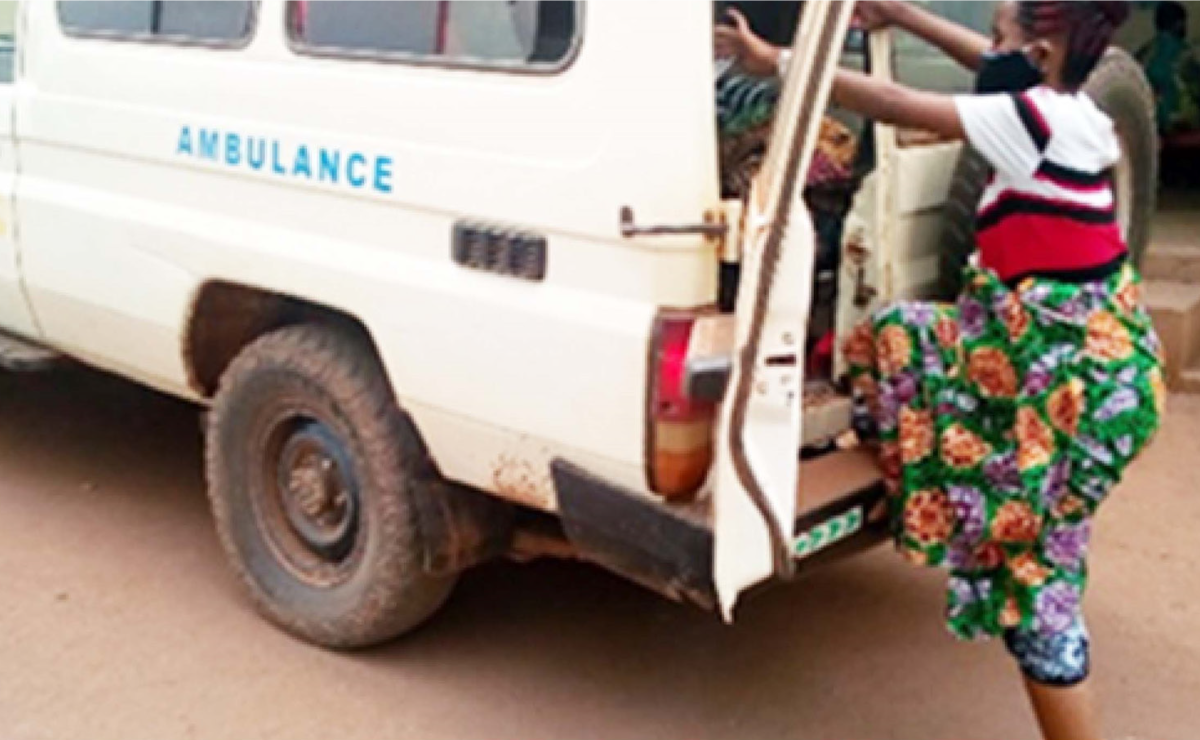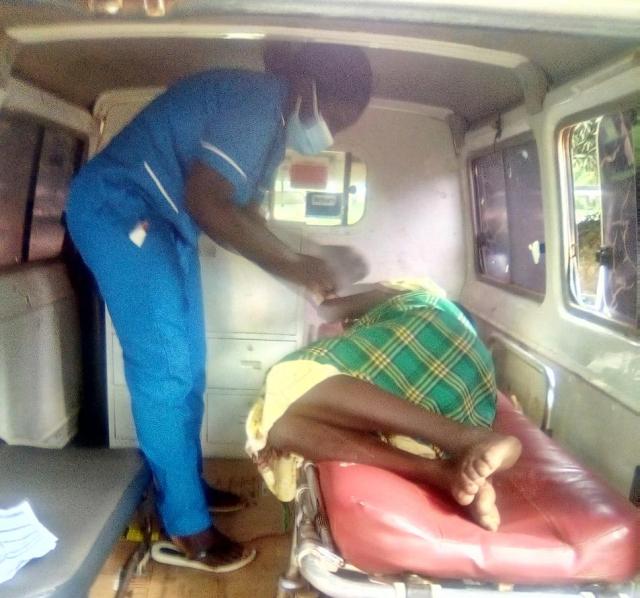LWF provides ambulances for refugee mothers

In April 2020, Rebecca Mapendo was three months pregnant when she felt a sharp pain in her lower abdomen.
The 31-year-old Congolese refugee lives with her husband in the kyangwali settlement located in South Western Uganda.
Mapendo was thrown off when she started bleeding from her genitals. Since she was still in the first trimester, the couple was yet to save any money in preparation for the baby.
Pondering how to get to the nearest health facility, 15kms away, Mapendo remembered she had an easier way out.
"I looked up the ambulance contact I was given during a pregnancy mapping activity a month ago," Mapendo recollects.
LWF had visited Mapendo's village for pregnancy mapping to locate expectant mothers for emergency response in case of any need. "I called, and it didn't take long before the ambulance arrived in my compound to pick me up," Mapendo adds.
At Kasonga Health Centre IV, Mapendo arrived on time. She was examined and treated.
"I could not believe the baby and myself had survived," Mapendo rejoices. "Many of my colleagues here and back in the Democratic Republic of Congo (DRC) have lost their young ones in similar circumstances."
Mapendo arrived in the Kyangwali settlement in 2016 after escaping a devastating rebel attack that claimed the lives of her seven children and husband. "The war took everything from me," laments Mapendo.
To rebuild her life, Mapendo has since remarried and has a four-year-old son with her new husband, a Congolese refugee. With such a heart-breaking history, losing another child would be too much for Mapendo to bear.
She appreciates LWF and UNFPA for facilitating Village Health Teams (VHTs) who keep checking on them. Annet Pita, a teenage mother in Bidi-bidi settlement, attests how the ambulance saved the life of her premature twins.
The 18-year-old South Sudanese refugee got pregnant during the 2020 Covid-19 lockdown after the closure of schools.
With the boyfriend stuck in neighbouring South Sudan when Uganda closed the border as a measure to prevent the spread of COVID-19, Pita could hardly care for herself.
When she delivered premature twins at the nearby lower health centre, Pita didnot have money to hire an ambulance to transport her to the Health Centre IV, which provides more advanced newborn care.

Although the medical workers gave her a referral to a Health Centre IV, which provides more advanced newborn care, Pita didnot have any money to pay for her transport. "And neither could I sit on a Boda Boda with the two babies," laments Pita. In the desperate race to save the life of the young ones, the standby ambulance flashed a glimmer of hope. “I was relieved when the midwife at the facility called the ambulance, and my babies were admitted into the Neonatal Intensive Care Unit (NICU) at the next health centre on time."
Ms Irene Maturu, the acting District Health Officer of Yumbe district, where Bidi Bidi settlement is located, appreciates LWF and UNFPA for saving expectant mothers from delays and using riskier means like motorcycles and bicycles.
"We have seen a great reduction in the number of stillbirths and maternal mortality because the ambulance is on standby, fueled all the time, and maintained," Ms Maturu says,
"We can even finish a quarter without any maternal death registered or at most one compared to the years before when we would lose at least 2-3 mothers every quarter."
Indeed, there is a notable reduction in maternal and infant deaths across the districts of intervention. For example, Obongi district, which hosts the Palorinya settlement, registered zero maternal deaths in 2020, according to the Ministry of Health records.Arua, Adjumani, and Kikuube districts have registered a sharp decline from four maternal related deaths between January and June 2020 to one recorded between July and December the same year, according to the Health Management Information Systems (HMIS).
The recruitment of more midwives at the maternity wards has also reduced the waiting hours of mothers and accessibility of reproductive health services, a health worker at Boroli settlement notes.
"Since this year began, we have not registered any maternal death at this health facility," Ms Loice Abiria, an enrolled midwife at Biira Health Center III, says. "This is largely attributed to the availability of standby ambulance and added health personnel provided by the project."
Gender-based Violence
Because physical, sexual, or psychological harm by a spouse or partner is a significant factor in maternal and reproductive health, the project also delivers services to Gender-Based Violence victims. The intervention is done through VHTs who counsel, reconcile families, identify and refer victims for a health examination.
Through this intervention, peace has been restored in the family of Mary* (not real name), a 35-year-old from the host community of Teyao village in the Northern District of Agago.
Mary started facing domestic violence hardship shortly after the birth of her firstborn. For three years, Mary* would return from her small business to physical abuse perpetrated by the drunkard husband. "To make matters worse, he could not provide basic needs for the family because he spent all the money on drinking," laments Mary.
Not even interventions from clan leaders restored sanity that at one point she contemplated suicide. Her turning point came when she was invited to attend a sensitization meeting on SGBV prevention in 2020.
"I went back home and shared with my husband the effect of domestic violence on the family as shared at the meeting," says Mary. "I wept as I pleaded for him to stop violence that he was touched,” she adds.
"Slowly by slowly, my husband changed and started taking family responsibility. The beatings have also stopped." Behold, the fruits of a happy family is the six-month pregnancy that May was carrying at this interview in June. Unlike before, her husband has also agreed to attend antenatal care visits at the health facility.
This story was compiled by; Paula Amviko, Sajas Akabitunga, Olivia Ayebare and Harriet Athieno.
-END-

